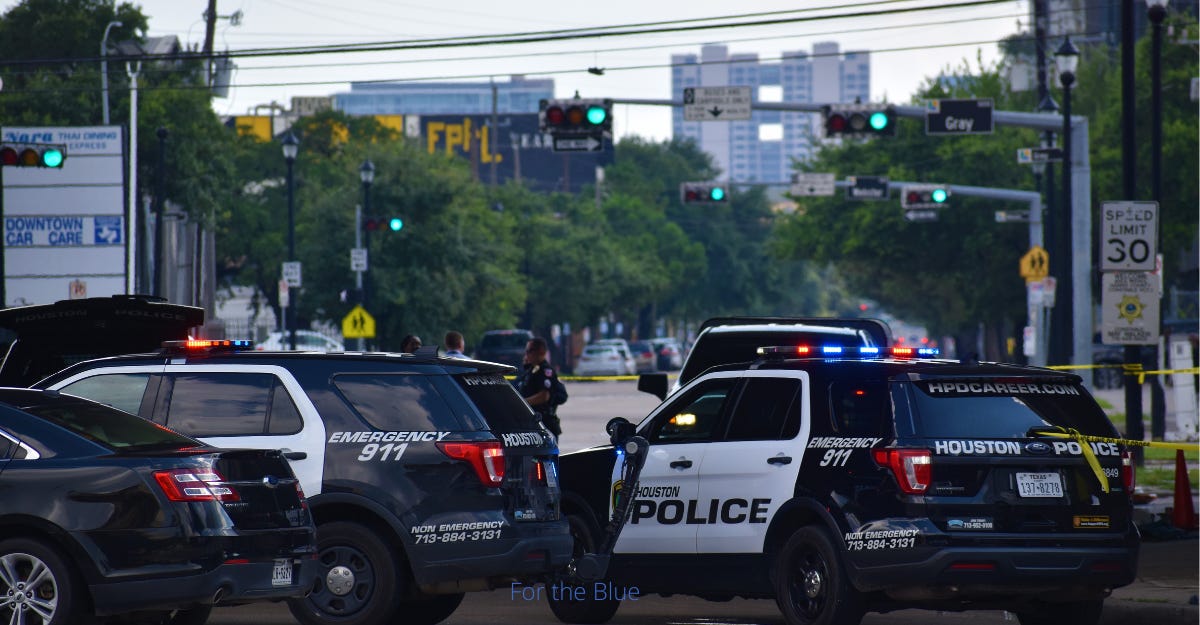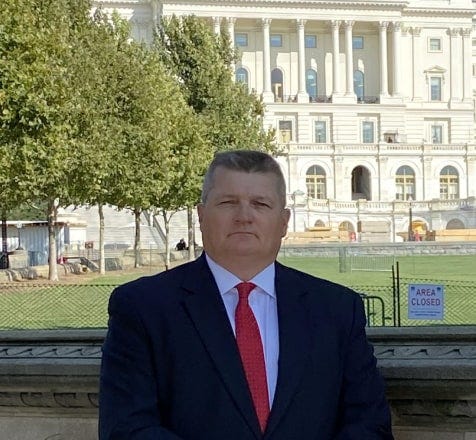Resources for Cops Facing Wrongful Prosecutions
An interview with National Center for Police Defense
After learning about how police officers are increasingly being indicted for upholding the law, I wanted to learn more about what was being done on their behalf. These are cops who had, by all reports, used force (sometimes lethal) in accordance with the law and their training.
Yet they were still being punished. Even those cases that had been officially cleared years prior, were being re-reviewed. It’s indeed reasonable to assume that cops are being used as political collateral.
All Police Officers Deserve Due Process of Law
We can all agree that police officers should be held to a higher standard. This doesn’t mean we eliminate due process of law and cater to the mob’s bloodlust. Our country can’t withstand these types of assaults on its Constitution.
This phenomenon is one of several factors that has contributed to the demise of policing. Cops can’t perform effectively with the fear of wrongful indictment weighing on their psyches. And when our guardians start second-guessing themselves, the rest of us are less protected.
Political persecution also upends the lives of indicted officers and their families. In addition to getting fired (which is more likely to occur under weak police leadership) and losing the ability to provide for their families, these cops face the prospect of serious prison time. Simply for doing their jobs.
Potential Resources for Police Officers
With this in mind, I’ve been reaching out to organizations and individuals who defend police officers placed in these positions. Here’s who has responded thus far.
Harmeet Dhillon
One person who promptly responded to my request is Harmeet Dhillon, who you may recognize as Andy Ngo’s attorney and a mainstay of news shows. Andy is the journalist who most notably covers Antifa demonstrations.
Aside from maintaining a law practice that primarily handles white-collar criminal cases, she also started a nonprofit consisting of a network of attorneys.
Would her organization take on the case of a cop wrongfully indicted?
“On a case by case basis, network lawyers might be willing to handle such cases, if there is some funding that can be raised from the public,” she told me.
A potential source of such funding is the Pipe Hitter Foundation, a nonprofit that provides legal defense financial help to wrongfully-indicted police officers. I’m awaiting their reply. Another that you’ll learn about shortly is the National Center for Police Defense.
I would have loved for Harmeet’s group to look at a case here in Wisconsin, but her network doesn’t extend here. Depending on where you live, however, her group may be able to handle your case.
National Center for Police Defense
Another person who kindly got back to me is Bert Eyler, vice president of National Center for Police Defense. I had the opportunity to chat with Bert about his organization’s mission. The following is a snapshot of our conversation.
Quick aside: Thank you for the overwhelming response to my Weak Police Chiefs: A Top Enemy of Law Enforcement article. This issue has clearly touched a nerve, and I will continue to cover it. If you’ve expressed interest in being interviewed for future articles on this topic, thank you! I’ll be in touch.
About the National Center for Police Defense
Formed in 2015, the National Center for Police Defense (NCPD) is a 501(c)(3) nonprofit organization offering financial and moral support to police officers who’ve been indicted. The group is based in Fairfax Virginia, a half hour drive from Washington, DC.
Most of their clients are officers who’ve been charged with crimes that occurred in the course of performing a lawful (and within the scope of their training) act that resulted in tragedy.
For example, former Newark (NJ) police officer, Jovanny Crespo was placed in a position most of us won’t ever have to experience - having to fatally shoot a suspect who, per Crespo, was pointing a gun at him. While this was indeed a tragedy, Crespo had this to say:
“I believe my actions kept me alive. I think about my four kids I have and I thank God I got to go home that night.”
For those actions, Crespo was not only suspended without pay, but he faces the possibility of life in prison for manslaughter and other related charges.
In the short time of its existence, NCPD has assisted 14 police officers whose cases were dropped. You can read some of the testimonials they’ve received here. Not all cases end as anticipated, though. Some officers are found guilty, or those like Officer Gary Wheeler, opt to take plea deals for fear of facing a partial jury.
They’re currently working with 16 police officers, and as Bert explained to me, the organization is continuing to grow.
NCPD also has an educational arm that works to make the public aware of radical prosecutors and judges. And through their legislative arm, they’ve introduced bills to enhance qualified immunity protection, and to raise the penalty for killing a police officer.
These two initiatives will be the focus of future articles.
A Q&A With Bert Eyler, Vice President of NCPD
Bert’s resume began with a career as a U.S. Marine and Marine Embassy guard. After his time in the military, he continued to serve, first as a sheriff’s deputy, then as a police officer with Prince William County (VA) Police Department, where he’s served as a school resource officer and worked his way up to Master Police Officer.
During his time in law enforcement, Bert received numerous awards, including two from his department for valor and the Virginia Public Safety Foundation Award for Valor.
The following Q&A is verbatim.
If you advocate for police officers, I’d love to interview you. If interested, please reach me at fortheblue@substack.com.
Question: Please tell me a little about your organization. How long have you been in existence? What was the impetus for forming it?
We started in 2015. Back in 2008, I was talking to a friend, Patrick Mooney and I told him what I wanted to do. He said that I needed to talk with Jim Fotis. He stated that Jim would be the person to talk to about starting the non-profit up. But at the time neither one us were in the position to give the time or the money to start the non-profit.
Between 2008 and 2015 Jim and I became great friends. During that time Jim had moved to Florida. By 2015 we both saw an upswing in officers being criminally charged for doing their jobs the way they had been trained.
Jim was able to work full-time on the non-profit. He was able to file all the paperwork to get our non-profit 501(c)(3) status, and he got the organization up and running. Since I was still working full-time, I could only work part-time with NCPD.
I did the research on the cases we were going to fundraise for. Then in July 2020, after 25 years in law enforcement I retired and started working full-time with NCPD.
Question: In which ways do you primarily help officers who ask for help?
There are several ways we help all our officers. We provide financial assistance for legal and personal expenses needed to help these police officers maintain a decent life while under indictment.
Question: Are your organization’s services different than what an officer’s police union representation might offer, or do they complement them?
The biggest difference is we can fundraise nationwide. Most police unions and associations can only fundraise in their state or geographical area of employment.
Also, most police unions only provide legal assistance. We provide financial assistance to help the officer pay some personal expenses associated with life after being charged. For example the officer may have been fired and cannot make his/her mortgage payment or buy food for the family.
We also have a peer support group and a chaplain on our staff. I reach out to all our officers and their family members on a regular bases to see what their needs are. Even the ones that are found guilty.
Question: Can you please walk me through your process for helping police officers in need? How difficult or involved is the process?
Our process is not that difficult. I look for cases, or someone may call asking for help. When I find a case I do research and find out as much as possible about the incident, officer and the suspect. I also use my 25 years of law enforcement experience for making my decision. After my research is done and I believe this is good case for NCPD, I write a brief and send it to the board of directors.
Then we get together and talk about the case. If we agree this is a case we want, I will reach out to the officer or his/her attorney. I will explain why I am calling and if we can assist the officers. If they accept our help we start working on raising money for them by direct mail, texts, and emails.
Question: Do you believe zealous prosecutions of police officers has intensified over recent years? Why do you think this is?
Yes, because these prosecutors are progressive and far left. They campaigned on going after the police. One example is the district in Austin, Texas where he has indicted 19 officers in the 2020 riots.
To learn how radical prosecutors are being allowed to permeate our criminal justice system, I recommend reading Justice for Sale by the Law Enforcement Legal Defense Fund called. Not only does the report show the connection between crime surges and the rise of “reform” prosecutors, it shows how campaign money is funneled to their election campaigns.
As I was writing this, I learned that Travis Yates, a multi-generational police officer and the person I interviewed for my weak leadership article, is leaving the profession. As he explains in his article:
“I used to talk cops out of leaving the job. Now I’m encouraging them.
It’s over America. You finally did it.
You aren’t going to have to abolish the police, we won’t be around for it.
And while I know, most Americans still appreciate us, it’s not enough and the risk is too high. Those of you that say thank you or buy the occasional meal, it means everything.
But those of you that were silent while the slow turning of the knives in our backs happened by thugs and cowards, this is on you.
Your belief in hashtags and memes over the truth has and will create an environment in your community that you will never expect.
If you think Minneapolis will turn into Mogadishu and that is far from you, it’s coming.
And when it does, remember what your complicity did.”
Travis is not an outlier.
The time for being at a “crossroads” in policing has passed. The damage that’s been done is too great, and even with the changes in legislation expected this November, we have a long road ahead.
Speaking of legislation, the results from my mid-term elections police questionnaire are coming soon. I think you’ll find the replies (and non-responses) informative.
For the Blue is a solutions-based initiative. I’m just an American patriot asking questions. I don’t work with any political party and I answer to nobody. For me, the health of the nation, due process (including for police officers), the rule of law, and respect for individual liberties, will always transcend party affiliation. I welcome your thoughts, even if you disagree; though personal attacks will be ignored. You can reach me at fortheblue@substack.com.







